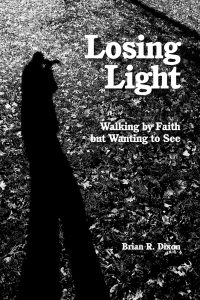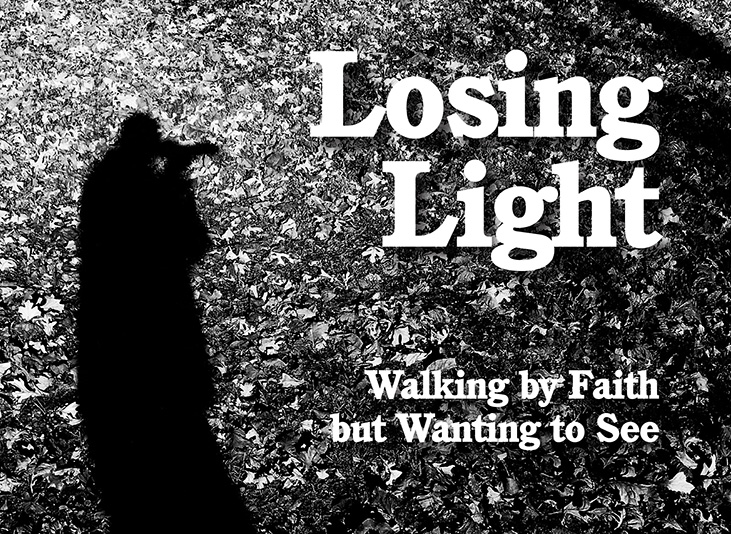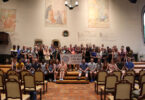Early in the Gospel of John, Jesus invites two questioning disciples to “Come and see.” As they turn to follow, the disciples cannot predict that the journey will take them from feast, to fear, to faith—from a wedding where the wine never ends, to a locked room where death shrouds the air, and finally to more than one encounter with the risen Christ and the promises of resurrection Life.
 In Losing Light: Walking by Faith but Wanting to See, the Rev. Brian Dixon (currently pastor, Emmaus Moravian Church in Emmaus, Pa.) invites readers on a similar journey through shadow and light. With a seeker’s questions and a pastor’s heart, he encourages us to “come and see” the fullness of life with God even if (and when) our vision is clouded or the way is unclear.
In Losing Light: Walking by Faith but Wanting to See, the Rev. Brian Dixon (currently pastor, Emmaus Moravian Church in Emmaus, Pa.) invites readers on a similar journey through shadow and light. With a seeker’s questions and a pastor’s heart, he encourages us to “come and see” the fullness of life with God even if (and when) our vision is clouded or the way is unclear.
The stories, poems and prayers collected in this volume do not shy away from the reality that in most lives, “heartache and hope lay stitched together” (“Herstory,” p. 61). Indeed, one of the first stories in the collection offers a compelling reminder of that truth.
In “The Garden on Eden Street,” friendship blossoms between two boys from very different backgrounds who meet in the open spaces of a new neighborhood. Their imagination soars as they build spaceships and seek buried treasure with one another. Joy is crushed to its root, however, by the hateful speech of an adult whose words wound and destroy, changing the way the boys view the world. As with several offerings in the book, the story invites a clear-eyed look at the human propensity to inflict harm rather than to live into God’s gifts of life and love.
Wherever one is along the journey of faith, there is always more to see.
The collection is divided into six sections of approximately 20 pages each, with the stories, poems and prayers in each section reflecting a slightly different theme related to light. Most of the entries are a page or two in length, although they range from four lines (“Riddle”) to five or six pages for some of the short stories (“An Industrial Fairy Tale”).
Indeed, the short stories—or parables, as Dixon rightly calls them—are my favorite parts of the book. Like the parables of Jesus, they draw on familiar settings and people to encourage deeper reflections on matters of faith. For example, the beauty found in a flower shop in “A Floral Parable” invites readers to consider the value of attention to (and intention about) one’s faith. “The Perils of Lights Attraction” led me to wonder whether or not I would recognize Jesus if he showed up at my front door.
 And, like most parables, those found in Losing Light often take an unexpected turn. I would not have predicted “The End of the World” from reading its opening page.
And, like most parables, those found in Losing Light often take an unexpected turn. I would not have predicted “The End of the World” from reading its opening page.
Reflection questions following each entry help readers to consider whether and how their own experiences might intersect with what they are reading. A few questions offer explicit insight into the author’s own thinking while others suggest biblical and theological themes that readers may want to explore further.
Some of the questions took me in directions I did not anticipate, or they suggested interpretations I had not considered. I’m grateful for the expanded vision that comes from seeing through another’s eyes.
The book’s format lends itself well to both individual and group reflection. One caveat: do not rush through the reading! Sit with the words. Read them again. It is worth pondering what we might hear if the Garden of Gethsemane could speak (“Walls Could Talk”), or what it means to claim “a faith of broken glass and crumbs of bread” (“Changing Tune,” p. 96).
Like those first disciples of Jesus, no one can predict the precise turns in their journey of faith. Whether one’s vision is clouded by shadow or blinded by light, Brian Dixon’s Losing Light is a faithful companion, inviting readers to “come and see” the love of God that accompanies every step.
Thanks to Audrey West, M. Div, Ph. D., for this review.Losing Light, along with Brian’s first book, Keeping Time, are available from the IBOC (store.moravian.org)







